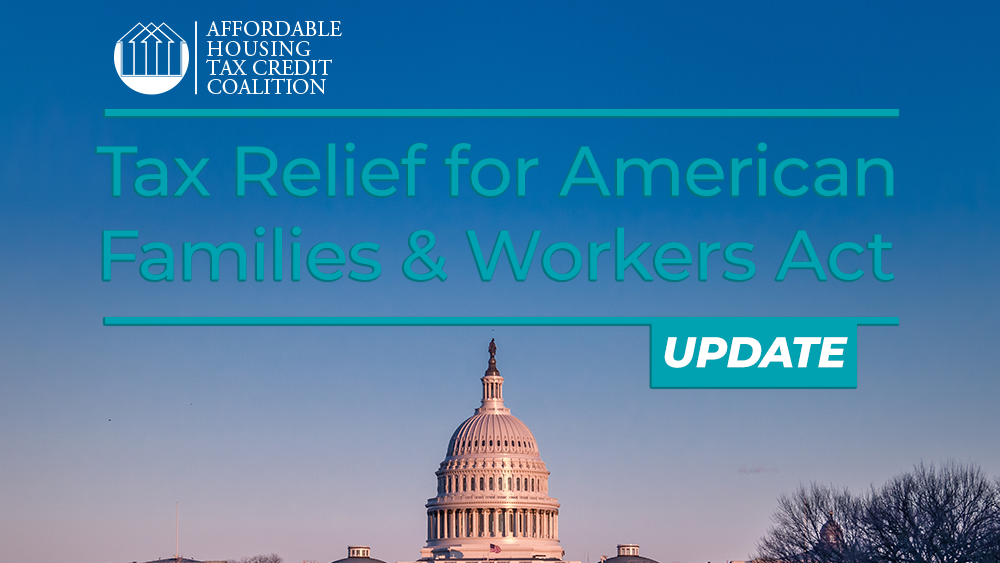Legislation includes top Housing Credit priorities to restore 12.5 percent allocation increase and lower 50 percent bond financing threshold
This evening the House of Representatives voted overwhelmingly to pass The Tax Relief for American Families and Workers Act of 2024 (H.R. 7024), bipartisan tax legislation which includes our top two Low-Income Housing Tax Credit (Housing Credit) production priorities—restoring the 12.5 percent allocation increase for 2023–2025, and lowering the 50 percent bond financing threshold to 30 percent for 2024 – 2025.
The legislation passed by a vote of 357-70, with 188 Democrats and 169 Republicans voting in favor of the bill. It passed under a suspension of the rules, a legislative process which requires a two-thirds majority vote of support in the House in order to pass, and allowed for sped up debate and precluded the ability of members to add amendments to the legislation on the House floor. During the debate on the legislation this afternoon, several members of Congress from both sides of the aisle spoke up in support of the Housing Credit provisions, including Reps. Darin LaHood (R-IL), Suzan DelBene (D-WA), Jimmy Panetta (D-CA), Don Beyer (D-VA), Dwight Evans (D-PA) and Nicole Malliotakis (R-NY).
“We are encouraged by the decisive bipartisan support in the House for tax legislation that would make the most meaningful dent in our nation’s affordable housing crisis in over two decades,” said Emily Cadik, CEO of the Affordable Housing Tax Credit Coalition. “The Low-Income Housing Tax Credit provisions in the Tax Relief for American Families and Workers Act of 2024 would finance over 200,000 affordable homes that are shovel ready, and we encourage the Senate to move quickly to advance this bipartisan legislation.”
“The affordable housing community is ready to get to work to build and preserve more sorely needed affordable rental homes for America’s low-income families and seniors,” said Ryan Sfreddo, President of the Affordable Housing Tax Credit Coalition and CEO of Red Stone Equity Partners. “We are thrilled to see the House advance common-sense proposals to address our nation’s acute affordable housing crisis through an expansion of the Low-Income Housing Tax Credit, a proven public-private partnership model with a 37-year track record of success. We hope to see these proposals signed into law soon.”
While the process for advancement in the Senate is still to be determined, the AHTCC and other advocates are urging for an immediate vote on the legislation, and are hopeful that the strong show of bipartisan support in the House tonight may encourage faster consideration. The AHTCC recently signed a letter, alongside 91 other affordable housing and community development organizations, advocating in strong support of these provisions and asking congressional leadership to enact the legislation as soon as possible.
Housing Credit Provisions and Next Steps
The core provisions included in this tax package, negotiated by Senate Finance Committee Chairman Ron Wyden (D-OR) and House Ways and Means Committee Chairman Jason Smith (R-MO), center around business tax extenders and the Child Tax Credit. The Housing Credit provisions were among a very short list of other tax provisions that were added to the initial agreement in the final legislation. The two included measures were adopted from the Affordable Housing Credit Improvement Act (AHCIA) of 2023 (H.R. 3238 / S. 1557), and the approved legislative text related to our Housing Credit priorities that passed the House can be found here.
If enacted, this legislation would:
- Restore the 12.5 percent allocation increase for 2023 – 2025. This allocation increase was initially enacted in 2018 but expired in 2021. The provision in this agreement would not extend the 12.5 percent retroactively for 2022, but would restore it retroactively for 2023 and keep the provision in place for the next two years.
- Lower the 50 percent bond financing threshold to 30 percent for Private Activity Bond (PAB) allocations made in 2024 – 2025.
Together, the approved provisions are estimated to finance the production or preservation of over 200,000 additional affordable homes, according to Novogradac. Enacting these provisions would also position our priorities for potential extension in 2025, when Congress is expected to enact major tax legislation due to the expiration of the individual tax provisions that were included in the Tax Cuts and Jobs Act of 2017 and now this current tax legislation.
Inclusion of these Housing Credit provisions reflects the widespread bipartisan support for the AHCIA, which has earned the co-sponsorship of nearly half of the House of Representatives as well as 30 co-sponsors in the Senate, equally balanced between Republicans and Democrats. In the 118th Congress, the AHCIA is led in the Senate by Sens. Maria Cantwell (D-WA), Todd Young (R-IN), Ron Wyden (D-OR), and Marsha Blackburn (R-TN) and in the House by Reps. Darin LaHood (R-IL), Suzan DelBene (D-WA), Brad Wenstrup (R-OH), Don Beyer (D-CA), Claudia Tenney (R-NY), and Jimmy Panetta (D-CA).



Comments are closed.